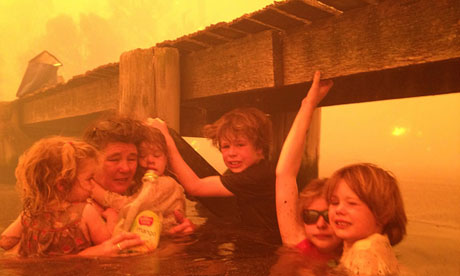

Massive fires, and now floods, seem to be more and more in the future of Colorado with each passing summer - the rest of the nation will see havoc too - ramping up this year.
As 2014 dawns the question on many people's minds is what sort of events it will bring. While the political and economic landscape remains somewhat uncertain, as well as the geopolitical (including the global surveillance system) we can pretty well predict that climate will continue toward chaos. We already got a taste of it last year with hundreds of massive wildfires, burning areas the size of whole states while pumping ever more CO2 into the atmosphere. We also beheld torrential rains and epic floods such as here in Colorado. All indicators point to even more climate instability this year with devastating tornadoes in the spring, followed by even more extended heat waves and wild fires and floods.
Are we at a tipping point? It's hard to say but we are certainly close. Climate scientist Bill McKibben notes there are three numbers we had better keep close track of if we want to preserve even a semblance of a livable world ('Mystery of the Three Scary Numbers', UTNE Reader, Jan-Feb, 2014, p. 18):
- 2 degrees Celsius or 3.6 degrees Fahrenheit
- 565 gigatons or 565 thousand million tons
- 2, 795 gigatons
The first number is the highest we can afford the global mean temperature to increase over this century without seeing the planet go into the crapper. We are talking the cusp of the runaway greenhouse effect, though many scientists don't want to scare too many people by outright saying so. They don't want to induce panic. According to McKibben, even a 2C increase is fraught with danger and passing that threshold will make our current wildfires, floods etc. look like a walk in the park. It's a number we don't wish to surpass or shouldn't. Many of us won't be around if it is surpassed (mainly baby boomers) but we do owe it to our offspring and their offspring to give a damn.
The second number represents the peak of humanity's carbon budget. It's the most carbon we can afford to pour into the atmosphere without triggering the 2 C temperature increase. For reference, humans poured some 30.6 gigatons into the atmosphere in 2011 and it is projected that unless massive carbon cuts go into effect we will pass the 565 gigaton threshold in 16 years. That means we will likely trigger the 2 C increase in that time - with all the havoc that implies. Think of no more seasons, wilting heat in the high 100s lasting for most of the year for most of the country and regular tornadoes, storms that make what we saw last year look like minor ripples on a pond.
The third number is perhaps the most worrisome of all and the one that instills fear into most who know what the future portends if we don't stop our reckless foolishness -including the fracking craze. It represents the total stored reserves of carbon held by coal, gas and oil companies. It was first highlighted and brought to global attention by the Carbon Tracker Initiative - a group of London financial analysts and environmentalists. It is what the fossil fuel industry plans to exploit in the future by its whole spectrum of methods, whether deep sea drilling, oil shale fracking or natural gas fracking.
It is, in other words, five times more carbon than will already blow a gasket in our world and send it toward runaway greenhouse perdition. Can you picture this scene unfolding everywhere and never ending:

In other words, as the UTNE piece observes:
"Burning those fossil fuels we would enter a world of science fiction dystopia: a rise in sea levels not seen in human history, species extinction, droughts, super storms, heat waves from hell....and consequences you cannot imagine".
What does McKibben say?
He states clearly and emphatically just because the reserves are there, we are not to use them! We need to "leave at least 80 percent of the fossil fuels in the ground"
Humans have a choice: either survival (even then barely tolerable) or being cast into a finite and terrestrial version of 'hell' if they can't control their energy demands.
This year may be the last in which we can actually exercise a degree of choice!
No comments:
Post a Comment